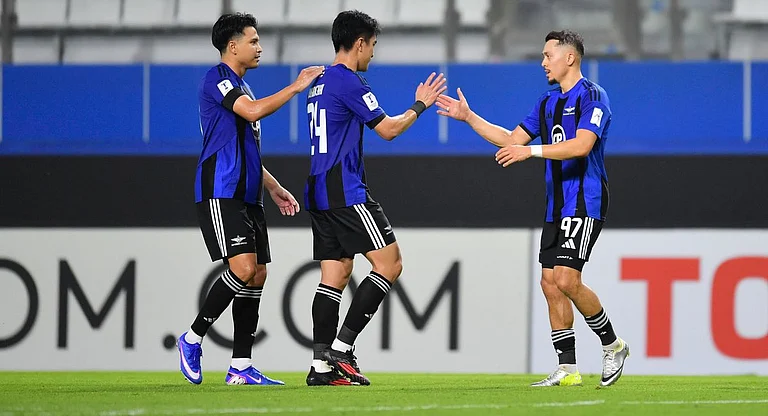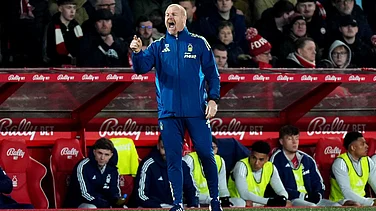In 2017, he received the prestigious Padma Shri -- India’s fourth highest civilian award -- alongside Virat Kohli, the National Award and Rajyotsava Prashasti -- Karnataka’s second-highest civilian award -- for his outstanding contribution to the field of cricket. What’s more, this former Indian cricket captain has a staggering record of 32 centuries in all formats.
But his only regret: Wish he had Mahendra Singh Dhoni’s luck. Despite achieving all these milestones, Shekhar Naik, the most run-getter in blind cricket, is jobless and struggling to meet daily expenses.

(Shekhar Naik with 2014 World Cup)
Naik, a resident of Karnataka’s Shivamogga district, is a perfect example how Indian blind cricketers are treated in the cricket-crazy nation despite the team winning two T20 and two ODI World Cups -- the latest being a nail-biting two wickets win over arch-rival Pakistan in the final at Sharjah on January 20.

(Shekhar Naik receiving National Award. PTI Photo)
Naik led India to two World Cup titles, first in the T20 format in 2012 defeating England in Bengaluru, and then the 2014 one-day World Cup against Pakistan in Cape Town.
“Despite playing for the country for 13 years, from 2002 to 2015, I haven’t got a permanent job. In November last year, I resigned from an NGO – Samarthanam Trust -- where I used to get only Rs 15,000 as monthly salary, thinking that the awards would help me a government job, but there have been only assurances from state and Union ministers so far,” Naik told Outlook.
The Indian blind cricket team was formed in 1998 and is currently being managed by the Cricket Association for the Blind in India (CABI), an independent entity backed by the Samarthanam Trust.
Naik, who last played an international match in England in 2015, was dropped from the squad over injury followed by his average performances in domestic cricket. Last year, as he turned 30, the board decided to give youngsters opportunities in his place.
Once a star batsman, Naik is now finding it hard to even pay the school fees of his seven-year-old daughter. With no other options left, Naik has started withdrawing the money that he had received from the state and central governments after winning the 2014 World Cup.
Most of Naik’s colleagues and the current World Cup winners have no better tales to tell.
All-rounder from Gujarat’s Valsad, Ganesh Mundkar, who has been playing for India since 2014, was one of the key players who helped his team defend the cup this year. He was Man of the Match in the semifinal against Bangladesh.
His parents work as labourers in a farm, while he has a small grocery shop.
"My family says that I should stop playing cricket, but it is my passion. Gujarat government has promised me a job after the World Cup win in 2014 and I am still waiting," said Mundkar.
Mundkar’s state-mate Anil Arya, also an all-rounder, distributes milk, while the father is a labourer. The total income of the eight-member family is only Rs 12,000 per month.
Prem Kumar from Kurnool, Andhra Pradesh, is in the B1 category (complete blind) and sings in an orchestra for livelihood.
"I get Rs 1,000-1,500 for a programme, and during Vinayak Chaturthi I get around 10 shows, while generally 2 or 3 shows in a month. It is not enough to run a family," said the all-rounder, who lost his eyesight due to chicken pox when he was seven.
Venkateshwar Rao, also from Andhra Pradesh, scored 68 runs against Pakistan in the World Cup league match and 35 in the final. He has scored four centuries against the neighbouring nation.
“Rao and his family can’t even afford to have the three-time meal a day. Many a time, he goes to bed without having food. His family earns around Rs 7,000 a month. Did you come across a single mainstream cricketer who had to skip his lunch because he didn’t have money?” Ajay Reddy, Indian team’s captain, told Outlook. He has 12 tons under his belt in 56 limited over matches.

(Indian blind cricket captain Ajay Reddy with PM Narendra Modi. PTI photo)
Reddy, a resident of Hyderabad, said most of the players in his team took loans from their relatives and friends before going to the World Cup. “It’s simply because of their love and passion for the game, we won the World Cup,” added Reddy, who works with the State Bank of India as an assistant manager.
Reddy and only four other players in the 17-member squad have government jobs. However, according to Rao, none of them got the jobs through sports quota.
‘Why Rajyavardhan Singh Rathore didn’t meet us?’
Mahantesh GK, president of the CABI, came down heavily on Union sports minister Rajyavardhan Singh Rathore for not meeting the players after the winning coveted championship.

(Mahantesh GK, president of the CABI, ANI photo)
"I don't know what else they want from our boys. We have consistently won four World Cups and one Asia Championship in less than 59 months," said Mahantesh.
Seemingly angry, Mahantesh added that the players are disappointed with the sports minister’s attitude.
“It’s good that he promotes Khelo India campaign. I also appreciate him for winning a medal at Olympics. But being a sportsperson himself, he should have taken a keen interest in the game. But he didn’t even wish us on phone,” added Mahantesh.
“Even small countries such as Bangladesh and Sri Lanka are recognised by their boards. . .Despite sending several letters to the BCCI in this regard, the board never gave us anything more than assurances. If Kohli and his men can get recognition and earn crores of rupees, why can’t our players? They too play for the same Tricolour,” he said.
He, however, said the ministry of social justice and empowerment and the sports ministry together have rewarded each player with Rs 7 lakh, while the BCCI gave Rs 3 lakh each after the lifting the World Cup.
On being asked about his demands from the government, Mahantesh, who is also the president of the World Blind Cricket Council, said: “There are many demands. We want at least one blind-friendly cricket stadium where our players could practice, and tournaments could be held. I am also planning to start under-19 training camps across the country and I demand the same from the government. But most importantly, we want the government recognition.”

(Indian team with President Ram Nath Kovind. Photo credit: president of India website)
On Wednesday, the team met the President and Vice-President who assured the prayers that they would look into the matter.





















